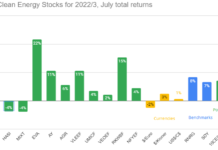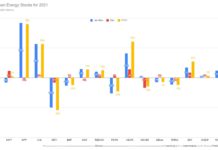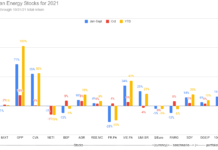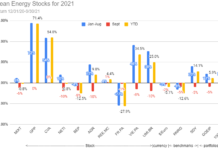 October was a spooky month for clean energy stocks. My benchmark Powershares Wilderhill Clean Energy Index (PBW) cringed down 2.9% like the young Supergirl who jumped when a mechanical ghost startled her at my door Haloween night. My 10 Clean Energy Stocks for 2014 model portfolio was more like Supergirl’s slightly older brother, who was dressed as a SWAT team member and insisted that he wasn’t scared: It rose a slim 0.9% since the last update on October 3rd. For the ten months since I launched the portfolio on December 26th, PBW is down 2.6% while the model portfolio is up 2.4%
October was a spooky month for clean energy stocks. My benchmark Powershares Wilderhill Clean Energy Index (PBW) cringed down 2.9% like the young Supergirl who jumped when a mechanical ghost startled her at my door Haloween night. My 10 Clean Energy Stocks for 2014 model portfolio was more like Supergirl’s slightly older brother, who was dressed as a SWAT team member and insisted that he wasn’t scared: It rose a slim 0.9% since the last update on October 3rd. For the ten months since I launched the portfolio on December 26th, PBW is down 2.6% while the model portfolio is up 2.4%
Meanwhile, the broader market of small cap stocks clawed its way out of a premature grave, digging its way up 6.3% for the month to end up 2.1% (as measured by the Russell 2000 index ETF, IWM.)
Individual Stock Notes
The chart and discussion detail the performance of individual stocks in the 10 Clean Energy Stocks for 2014 model portfolio, along with relevant news items since the last update.

(Current prices as of October 31st, 2014. The “High Target” and “Low Target” represent my December predictions of the ranges within which these stocks would end the year, barring extraordinary events.)
1. Hannon Armstrong Sustainable Infrastructure (NYSE:HASI).
12/26/2013 Price: $13.85. Low Target: $13. High Target: $16. Annualized Dividend: $1.04.
Current Price: $13.98. YTD Total US$ Return: 5.7%
Last month I predicted Sustainable Infrastructure REIT Hannon Armstrong would raise its fourth quarter dividend to 24¢ from 22¢. I was too conservative. In conjunction with the announcement of a $144 million investment in ten operating wind projects, President and CEO Jeffrey Eckel stated: “This investment should enable us to achieve core earnings of $0.25 in the fourth quarter and, in anticipation of further 2015 earnings growth, to support the declaration of an increase in our December dividend to $0.26 per share.”
The stock rally from the increased dividend was cut short a week later when the company announced a secondary equity offering of 4.6 million shares at $13.60, for gross proceeds of $63.56 million. The company has a target leverage ratio of 2:1 debt to equity, and since the company has not raised equity since $70 million (at $13.00/share) in April, this smaller offering should have come as no surprise.
The stock pull-back in response to the equity offering should be seen as a buying opportunity. At $13.89, the company’s forward yield is 7.4%, and this dividend was achieved by investing the roughly $10/share raised in the IPO and April offering. Any money raised at $13.60 a share should increase both book value per share and per share dividend once it is invested.
2. PFB Corporation (TSX:PFB, OTC:PFBOF).
12/26/2013 Price: C$4.85. Low Target: C$4. High Target: C$6.
Annualized Dividend: C$0.24.
Current Price: C$3.98. YTD Total C$ Return: -14.2%. YTD Total US$ Return: -18.5%
Green building company PFB continued to decline until October 30th, when the company announced its third quarter results. Earnings per share increased to C$0.23 from C$0.14 in the third quarter of 2013, along with a 7% increase in revenue and an increase in gross margin. Full financial statements for the quarter will be filed on or before November 14th.
The company announced its regular 6¢ dividend, payable to shareholders of record on November 14th. This amounts to a 6% annual dividend at the $4 current price.
3. Capstone Infrastructure Corp (TSX:CSE. OTC:MCQPF).
12/26/2013 Price: C$3.55. Low Target: C$3. High Target: C$5.
Annualized Dividend: C$0.30.
Current Price: C$4.27. YTD Total C$ Return: 30.8%. YTD Total US$ Return: 24.4%
Independent power producer Capstone Infrastructure will release third quarter results after the close on November 11th.
4. Primary Energy Recycling Corp (TSX:PRI, OTC:PENGF).
12/26/2013 Price: C$4.93. Low Target: C$4. High Target: C$7.
Annualized Dividend: US$0.28 (suspended pending buyout.)
Current Price: C$5.82. YTD Total C$ Return: 22.3% . YTD Total US$ Return: 16.3%
Waste heat recovery firm Primary Energy Recycling rallied on the news that the board’s strategic review had resulted in a buyout offer from a group of investors led by Fortistar at US$5.40 per share. The deal seems very likely to win shareholder approval, since it has the unanimous approval of the board, and investors controlling 44.5% of common shares are subject to a lock up agreement to vote their shares in favor of the deal. Only 66⅔% of outstanding shares is needed to approve the deal.
5. Accell Group (Amsterdam: ACCEL, OTC:ACGPF).
12/26/2013 Price: €13.59. Annual Dividend €0.55 Low Target: €11.5. High Target: €18.
Current Price: €12.73. YTD Total € Return: -2.3% . YTD Total US$ Return: -10.9%
SNS Securities increased its price target for Netherlands based bicycle manufacturer and distributor Accell Group from €13 to €14, but the stock posted a small decline along with European stocks in general.
Accell continues to integrate last year’s acquisition of Raleigh, which will now distribute its Dutch-based Koga brand in the UK. Its Sparta brand sold its 1000th speed pedelec (an electric-assisted bike with unrestricted top speed which must be registered as a
motorized vehicle) in October. Sparta leads the accelerating Dutch market for speed pedelecs with roughly 60% of the market.
6. New Flyer Industries (TSX:NFI, OTC:NFYEF).
12/26/2013 Price: C$10.57. Low Target: C$8. High Target: C$16.
Annualized Dividend: C$0.585.
Current Price: C$13.00. YTD Total C$ Return: 27.6% . YTD Total US$ Return: 21.3%.
Leading transit bus manufacturer New Flyer made headlines with its delivery of two fully electric buses to the Chicago Transit Authority. The purchase shows that fuel savings alone do not yet support purchase of electric buses by transit agencies, as they cost $400,000 more than conventional diesel buses, but will save approximately $300,000 in fuel costs over their 12 year lifetime. However, they deliver other benefits such as no exhaust (a benefit to anyone standing or driving behind them), a smoother and quieter ride for passengers, and likely lower maintenance costs.
The company will announce its third quarter results on November 5th and hold a conference call on November 6th. It paid its regular monthly dividend of C$0.0475.
7. Ameresco, Inc. (NASD:AMRC).
12/26/2013 Price: $9.64. Low Target: $8. High Target: $16. No Dividend.
Current Price: $8.24 YTD Total US$ Return: -14.5%.
The stock of energy performance contracting firm Ameresco recovered 11% from previous lows, but remains down for the year. Part of the jump was likely the result of a series of transactions by the new New York Green Bank which will provide funding for the types of projects Ameresco specializes in. The announced projects have a large number of financial partners, but the only developers were Ameresco and privately held BQ Energy.
I also expect that the October rise is partly in anticipation of likely positive third quarter results and outlook. The second quarter was the first relatively upbeat conference call after a series of disappointments starting in 2012. If the third quarter outlook (to be announced on November 6th) is also upbeat, expect the climb to continue this month.
8. Power REIT (NYSE:PW).
12/26/2013 Price: $8.42. Low Target: $7. High Target: $20. Dividend currently suspended.
Current Price: $10.12 YTD Total US$ Return: 20.2%
Solar and rail real estate investment trust Power REIT and its opponents Norfolk Southern Corp. (NYSE:NSC) and its sublease Wheeling & Lake Erie Railway filed responses to each others motions for summary judgment in their civil case. The filings can be found on the Power REIT website.
Both a litigation researcher on Seeking Alpha and I think the case may be nearing a finish, and we published our analyses virtually simultaneously. My analysis is here, and a more pessimistic view by a new anonymous author is here. The author, “Small Cap Litigation Research” or SCLR claims not to have a position in the stock (I am long) and I feel he or she missed several subtleties of the very complex case despite a legal background.
To summarize the article, SCLR believes that
- Power REIT’s attempt to discount the performance of the lease in its interpretation is unlikely to succeed.
- NSC is demonstrating its confidence by continuing to omit the lawsuit as a legal risk in its SEC filings.
- At the current price of $10, current shareholders are betting on a windfall profit.
I’ll take each of these points in turn.
1. Performance under the lease.
Since I’m not a legal expert, I don’t have an opinion on how relevant the performance of the parties over the last 50 years will be to the judge’s decision. Even if SCLR is correct that performance is very relevant to the interpretation of the lease, there are many possible defaults under the lease to which performance is irrelevant because they have not come up previously. In particular, the lease provides that the lessees pay legal expenses which are “necessary or desirable” for the maintenance of PW’s interest in its property, so long as these expenses are “not for the sole benefit of its shareholders.” Since the lessees have paid some legal expenses in the past, this part of the case (which could lead to total default under the lease) rests not on performance, but on the court’s interpretation of what is for the “sole” benefit of shareholders, and what is “desirable.” I discuss in my article why Power REIT’s case seems strong in this regard.
Another possible default under the lease to which performance is not relevant would be WLE’s sale of mineral rights, which are not explicitly conveyed by the lease. PW only became aware of this over the course of the lawsuit, so could not have previously acquiesced to such sales.
2. NSC’s apparent confidence.
SCLR fails to distinguish between NSC and WLE. While it is true that NSC has not disclosed this lawsuit in the legal risks section of any of its SEC filings, it is WLE, the sublessee, which will be responsible for paying the majority of any award. As I discussed in an article linked to by SCLR, the sublease agreement limits NSC’s liability to the $7,466,951.42 balance of a “settlement account” described in the lease as of the closing date of the sublease agreement. This liability is most likely already disclosed on NSC’s books as long term debt. Given its tiny size relative NSC’s $34 billion market cap, the outcome of the lawsuit would only be material to NSC if the judge were to award back interest on the settlement account. In my judgment, NSC is probably correct in its confidence that back interest will not be awarded, and so the results of the case are not likely to be material to NSC. I still believe NSC should be disclosing the lawsuit despite its confidence, accompanying the disclosure with a statement that the chances of the lawsuit resulting in a material liability to NSC are low, if that is the opinion of management. The intent of such disclosures is not to predict what will likely happen, but rather to disclose what might happen..
WLE, on the other hand, is potentially responsible for more than half of the $16 million balance of the settlement account, PW’s legal bills, may be forced to renegotiate the lease if it is found in default, and has a chance of owing back interest as well. While these potential liabilities are certainly material to WLE, the company is privately held and so has no responsibility to make public statements about the lawsuit.
Hence, NSC’s apparent confidence is only relevant to the possibility that back inter
est might be awarded, and has no bearing on most of the matters of contention.
3. Are investors betting on a windfall?
Neither SCLR nor I provided a valuation of PW in our articles, so it is difficult to judge from them if shareholders are betting on a windfall profit. I did however, provide a back-of-the-envelope valuation in response to a comment. I responded,
PW has about $1.9 million in annual revenue from its leases (Rail and Solar.) Recurring expenses are about $0.8M, including interest, so we have about $1M to pay dividends each year. As of the end of June (the last 10Q), there were 130,000 preferred outstanding, with an annual dividend of $0.25M. That leaves $0.75M to pay dividends on 1.73M common shares, or 40-45 cents a share.
If PW lost, they would write off the settlement account, meaning that dividends would become classified as return of capital for the next 16 years or so. The ending of the lawsuit would also remove uncertainty, and allow Lesser to resume the yieldco business plan as well as make it easier to refinance the debt used in the solar acquisition. So the answer to your question depends on what you think the market would pay for a stock with a 40 cent annual return of capital dividend (i.e. deferred income taxed at the LT cap gains rate) and some potential for growth. I personally would be happy to buy such a stock at a 5% yield (the cheapest yieldcos trade at 4%), which would be $8 to $9, but it would probably fall below $8 in the short term, especially since the dividend would not be resumed until unpaid attorneys fees had been paid off. Those will probably amount to $2 million or so, so the dividend would likely remain suspended for 3 years. Hence, we should discount back my $8 estimate by 3 years at something like 15%, which also gives me a $5 downside.
My best guesses on the probabilities of various outcomes and valuations are:
- 25% – PW loses on all counts – $5
- 40% – PW collects a portion of settlement account and legal fees – $10
- 30% – PW collects entire settlement account & legal fees – $15
- 5% – PW collects legal fees, settlement account, and also has upside from renegotiating lease and from some asset sales or interest not included in NSC/WLE version of settlement account – $20+
The weighted average of these outcomes is $10.75.
If my estimates are correct, shareholders are only betting on a mixed result to the lawsuit, which I gave a 40% likelihood among the scenarios I evaluated.
In summary, the flaws in SCLR’s analysis all of favor the lessees over PW. SCLR claims to have no position in the stock, which could be the reason for a lack of diligent research. Another possibility is that the writer is actually short the stock, and is looking to profit from a decline caused by the article. If that is the case, SCLR is unfortunate that we were working on our articles simultaneously.
9. MiX Telematics Limited (NASD:MIXT).
12/26/2013 Price: $12.17. Low Target: $8. High Target: $25.
No Dividend.
Current Price: $8.91. YTD Total ZAR Return: -21.6%. YTD Total US$ Return: -26.8%
South Africa based global provider of software as a service fleet and mobile asset management, MiX Telematics will announce its fiscal second quarter 2015 results on November 6th.
10. Alterra Power Corp. (TSX:AXY, OTC:MGMXF).
12/26/2013 Price: C$0.28. Low Target: C$0.20. High Target: C$0.60. No Dividend.
Current Price: C$0.32 YTD Total C$ Return: 14.3% . YTD Total US$ Return: 8.6%.
Renewable energy developer and operator Alterra Power completed the construction financing for its 62 MW Jimmie Creek run-of-river hydroelectric expansion in conjunction with its development partner, Fiera Axium. The company will announce its third quarter results after market close on November 12th.
Conclusion
Although October spooked many clean energy stocks, my model portfolio did not take fright. Hannon Armstrong’s larger than expected dividend increase, and the announcement culmination of Primary Energy’s strategic review helped keep the ghosts at bay. I included both in the list because I knew these positive events reasonably likely, and am glad they came at such an opportune time.
Disclosure: Long HASI, PFB, CSE, ACC, NFI, PRI, AMRC, MIXT, PW, AXY, FVR, FF.
DISCLAIMER: Past performance is not a guarantee or a reliable indicator of future results. This article contains the current opinions of the author and such opinions are subject to change without notice. This article has been distributed for informational purposes only. Forecasts, estimates, and certain information contained herein should not be considered as investment advice or a recommendation of any particular security, strategy or investment product. Information contained herein has been obtained from sources believed to be reliable, but not guaranteed.







